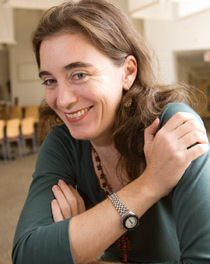 loading
loading
Where They Are NowThe planet doctor Julie BrownKinari Webb ’02MD, pictured here on a recent visit to Yale, is using health care as an incentive to stop deforestation in Borneo. View full imageKinari Webb ’02MD took a year off from Reed College in 1993 to study orangutans in Borneo. She had intended to make this work her career, but when she saw the suffering of the people there, she decided to become a physician instead. But she never forgot her concern for the survival of the orangutans, or of the tropical ecosystem in general. In 2005, she founded Health in Harmony, setting up a clinic that aims to provide health care to the 60,000 residents of 23 villages on the borders of Gunung Palung National Park—while encouraging them to save the forest they call home. She lives and works there with her husband, Campbell Webb, a tropical ecologist. Y: I recently read that the deforestation is happening faster in Borneo than anywhere else on earth. W: [Borneo] just got in the Guinness Book of World Records for being so impressively quick at their deforestation. Where I live the average income is $13 a month, less than half the World Health Organization standard for absolute poverty. [Villagers] have minimal access to health care, and they have few other economic opportunities except illegal logging. So we’re trying to find ways to think about the needs of the people and the needs of the environment, and trying to combine them with respect for both. Y: So, concretely, how are you doing that? W: Most of the local people believe the national park should be protected. But residents cut [the trees], too. We provide health care to everyone—we never deny anyone health care. But we offer extra health care incentives to communities that are protecting the forest, and in this way we hope to garner peer pressure to encourage the cheaters to stop. Y: What incentives do you offer? W: The villagers decided the incentives they want are ambulance service, mobile clinic visits, and training in organic farming and health care. And then we offered additional discounts at the clinic. Y: How’s it going? W: Since we began in November 2008, we have seen a 30 percent decrease in the number of villages where there is illegal logging. However, it’s hard to know for certain how much of that is us. What’s encouraging is that the heads of some of the villages have told us specifically they have stopped logging in order to receive the extra benefits. But it’s not going to be a quick fix. Y: Tell me about how people live in these villages. W: We did a baseline study recently and found that 30 percent of the people had to choose between food and medicine. We found that a lot of people are experiencing severe medical emergencies, at a cost of $460, but people are making only $310 a year doing illegal logging. So just providing health care at a reasonable cost may completely offset an entire year of illegal logging. Y: How do they pay for their care? W: We allow people to pay with alternative means besides cash. You can pay by working in our organic garden, or doing laundry, or any number of other jobs. We have patients who are blind and unable to do anything else, and we need lots of help making cotton balls, so they sit and make cotton balls. We also allow people to trade goods—manure, hand-woven baskets, even chickens sometimes. Very popular also is to trade seedlings, which we hope to use in our alternative work program, which is reforestation. Y: Can you give a few examples of how the care you provide has improved people’s lives? W: We recently did cataract surgery on 76 patients who were completely blind; we had a team of surgeons come in from Jakarta. We have a program to treat tuberculosis where women we’ve trained from the local communities go to people’s homes to make sure they’re taking their medicine. Y: What about malaria? W: There’s very interesting data that show malaria is actually higher in deforested areas. So we’re working with the communities to reforest. They exchange their seedlings for mosquito nets, and they’re protected from malaria with the mosquito nets, but also by reforestation. Y: What’s the hardest thing about the work you do? W: It’s the pain of watching the environment destroyed—hearing the chain saws, finding it hard to breathe because of the smoke from burning forest. My husband hiked into the research station in the middle of the national park a few weeks ago and had to hike through long areas of horrible devastation from illegal logging. On the way in he saw two enormous strangler figs still standing, but three days later both had been cut down. Now what is the point of that? The wood can’t even be used, and the figs are critical keystone species for the animals in the forest. Y: Has there ever been a time when conservation goals conflicted with health goals? W: No. Logging is not a sustainable solution. One could say if [villagers] logged all the forest, they would do better for a short while, they would have a little bit more money. But then they’d be as bad off as before, and the forest would be gone.
The comment period has expired.
|
|